
by: SEO Strategist
Ashot Nanayan
Ashot Nanayan is the CEO and Founder of DWI and a seasoned SEO strategist. With a proven track record of...
All Articles by Ashot Nanayan
Updated August 4, 2025
22 min read
In recent years, SEO has turned into a marketplace where nearly everyone is buying and selling links. Many still find great success today, while others face penalties from Google.
Buying backlinks is one of those topics that makes SEO experts either whisper like it’s a deep, dark secret or yell like it’s the apocalypse. However, buying backlinks can work wonders for your rankings. Done wrong? Well, you might as well tattoo “penalized by Google” on your forehead.
In this blog, we’re cutting through the noise. I’m not here to repeat the same tired talking points you’ve seen a hundred times. We’re diving deep into the pros and cons of buying links, the strategies that work, and the mistakes that could cost you big time. More importantly, I’m spilling the tea on real examples and practical tips from my own experience; yes, the stuff you won’t find in a generic “How to SEO” guide.
Imagine, this post as your no-BS guide to buying backlinks, where we go beyond the basic content and uncover the behind-the-scenes tactics that take your strategy to the next level. Whether you’re looking to rank #1 for a competitive keyword or just want to avoid the rookie errors that lead to wasted money and frustration, this is the blog you need to bookmark.
So, grab your coffee, get comfortable, and let’s dive into the insider knowledge you’ve been waiting for. Trust me, you don’t want to miss this.
As detailed in my extensive link-building guide, there are multiple strategies for securing backlinks. I would like to emphasize again that buying links is among the commonly used methods.
Businesses, especially those unfamiliar with SEO, have heard that backlinks help increase organic traffic and push keywords to the top of search engines. In most cases, without further investigation, they hire SEO agencies or freelancers to buy backlinks for their company website and often take heavy damage by falling into a fairly well-prepared trap.
On the other hand, not all businesses have the capacity or resources to consistently produce high-quality content, which is essential for earning organic backlinks. As a result, many businesses aim for rapid growth and believe that purchasing backlinks is the quickest and easiest solution.
Recently, our SEO agency conducted an in-depth survey across 376 website owners, marketers, and SEO professionals to uncover insights about buying backlinks. Here are some of the most compelling findings that shed light on the current state of the link-buying landscape:
‣ Our survey revealed that 85% of respondents admitted to purchasing backlinks at least once, highlighting how widespread the practice has become in competitive niches.
‣ According to the data, the average cost of a backlink is $200, though this figure varied significantly depending on domain authority, niche, and content quality.
‣ Surprisingly, 67% of those surveyed stated they would prefer backlinks from niche-relevant sites with lower authority rather than generic high-DA sites.
‣ The survey found that 93% of purchased backlinks are dofollow, indicating that most buyers aim to pass SEO value and improve rankings.
‣ About 40% of respondents said their link purchases occurred as part of outreach efforts, with website owners requesting compensation for placements.
‣ The top three industries where link buying is most common include tech (21%), health (18%), and finance (15%), where competition for search rankings is fierce.
‣ Alarmingly, only 27% of respondents reported tracking the return on investment (ROI) from their purchased backlinks, suggesting a gap in measuring link-building effectiveness.
‣ A majority (72%) of respondents cited the need for faster rankings improvement as the primary reason for buying backlinks.
Our survey highlights not only the prevalence of link buying but also the motivations, strategies, and challenges associated with it. These insights provide a clearer picture of how the industry operates today and where it may be headed next.
In general, there are no laws that specifically make buying or selling backlinks illegal. However, the practice can lead to legal issues if it involves deception or violates advertising regulations, especially concerning disclosure requirements.
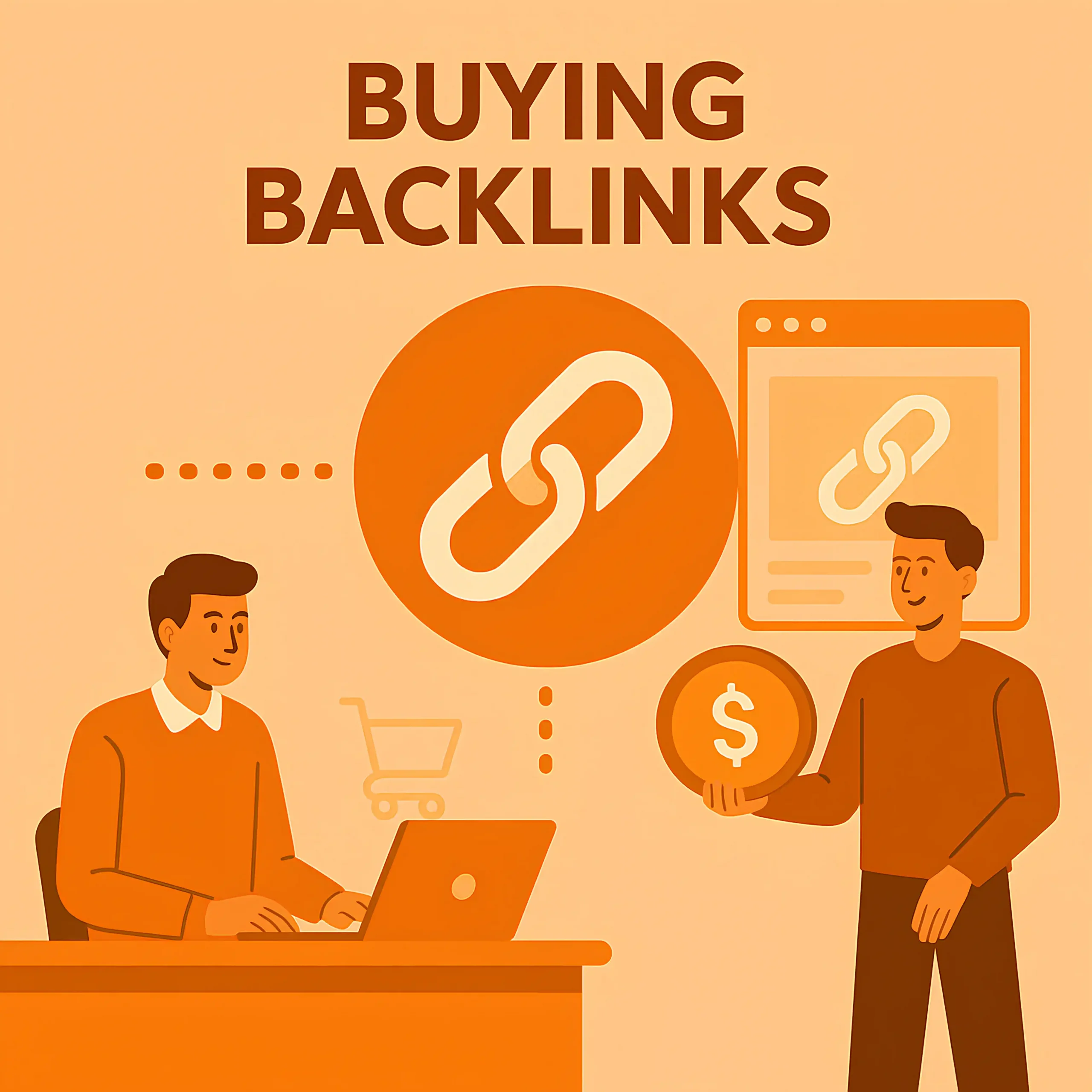
The UK’s Advertising Standards Authority (ASA) mandates that all marketing communications be clearly identifiable. Under the UK Code of Non-broadcast Advertising and Direct & Promotional Marketing (CAP Code), failing to disclose paid endorsements, including paid backlinks, can be considered misleading.
If a publisher provides a dofollow link in exchange for payment or other consideration, they must disclose this relationship. Failing to do so can violate the Consumer Protection from Unfair Trading Regulations 2008, which prohibits unfair commercial practices.
Federal Trade Commission (FTC): The FTC requires clear and conspicuous disclosure of any material connections between endorsers and advertisers. This includes paid backlinks. Publishers must indicate sponsored content to avoid misleading consumers.
Unfair Commercial Practices Directive: EU regulations prohibit misleading commercial practices. Not disclosing paid backlinks can be considered deceptive, leading to legal consequences under consumer protection laws.
Many countries have their own advertising standards and consumer protection laws requiring transparency in marketing communications. It’s essential to be aware of local laws to ensure compliance.
Google’s Webmaster Guidelines explicitly prohibit buying or selling links that pass PageRank. This includes exchanging money for links, goods, or services for links, or sending someone a “free” product in exchange for them writing about it and including a link or excessive link exchanges (“Link to me and I’ll link to you”) or partner pages exclusively for the sake of cross-linking.
Google’s webspam team may apply manual actions to sites that violate these guidelines, which can result in lower rankings or removal from search results.
Instead, Google recommends creating valuable, original content that naturally attracts backlinks from other reputable sites or participating in legitimate marketing efforts, such as outreach, PR link-building, and content marketing, to earn links.
The short answer is yes, but only if you truly know all the ins and outs of buying links, and you must be very careful. Sometimes, you may not even have another choice if you’re in a gray niche such as loans (payday loans), weed, gambling, and similar because many site owners fear that linking to such content could lead to penalties from search engines or harm their own site’s reputation.
They’re concerned about violating advertising policies or being associated with topics that are subject to strict regulations and scrutiny. Consequently, websites are often uncertain to provide backlinks to sites in these niches, making it almost impossible to build an organic backlink profile through traditional methods.
Another scenario is when your website hasn’t yet built a reputation or demonstrated expertise in its field. In such cases, other websites avoid providing organic backlinks because they are unsure about the quality and reliability of your content.
That’s why buying backlinks might seem like a faster and more efficient way to improve your website’s SEO.
The cost of a typical backlink ranges from $100 to $600, depending on various factors such as the industry, the organic traffic a website generates, and the type of link-building technique you’re using. Are you focusing on guest posting? Maybe HARO link-building or perhaps link insertion? Each approach comes with its own nuances, challenges, and, yes, costs.
Some vendors are shouting prices like $50 per link. Others are calm and collected, asking for $500 or more. And then, there are those mysterious ones who just smile and say, “It depends.”
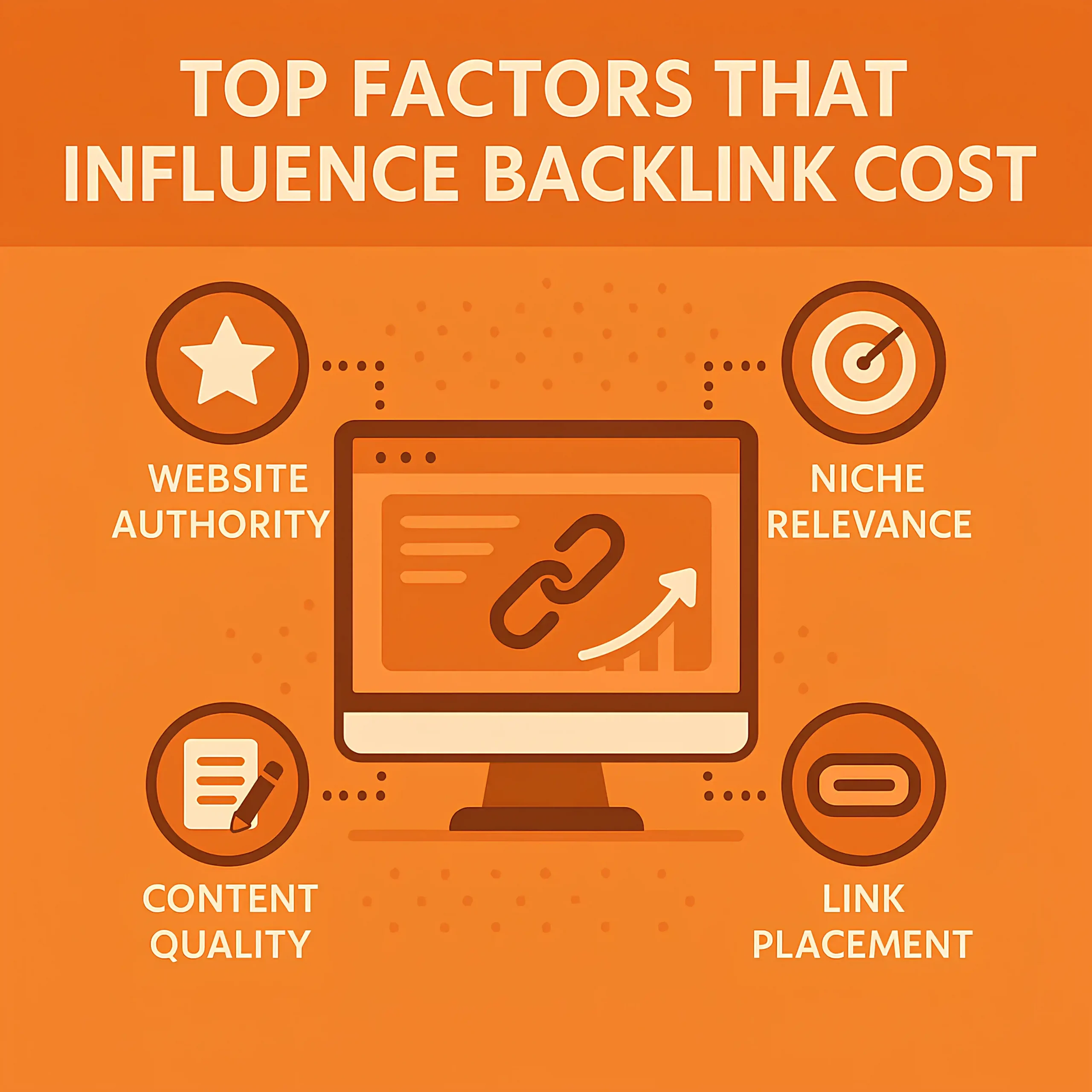
Why such a range? Well, backlinks aren’t all created equal. Some are like solid gold, they come from highly trusted, authoritative sites, driving traffic and trust to your site. Others? They’re like cheap trinkets. Pretty, maybe, but they won’t hold up under scrutiny, and they might even hurt you.
Curious to learn more? I dive deeper into the factors affecting backlink pricing and strategies to maximize ROI in my guide, Link Building Pricing. If this topic has piqued your interest, trust me, you’ll find plenty of insights there.
The number one risk associated with link purchasing is that Google may apply manual penalties or remove your website from search results entirely. Algorithms like Google Penguin detect unnatural linking patterns, which can lead to automatic ranking drops.
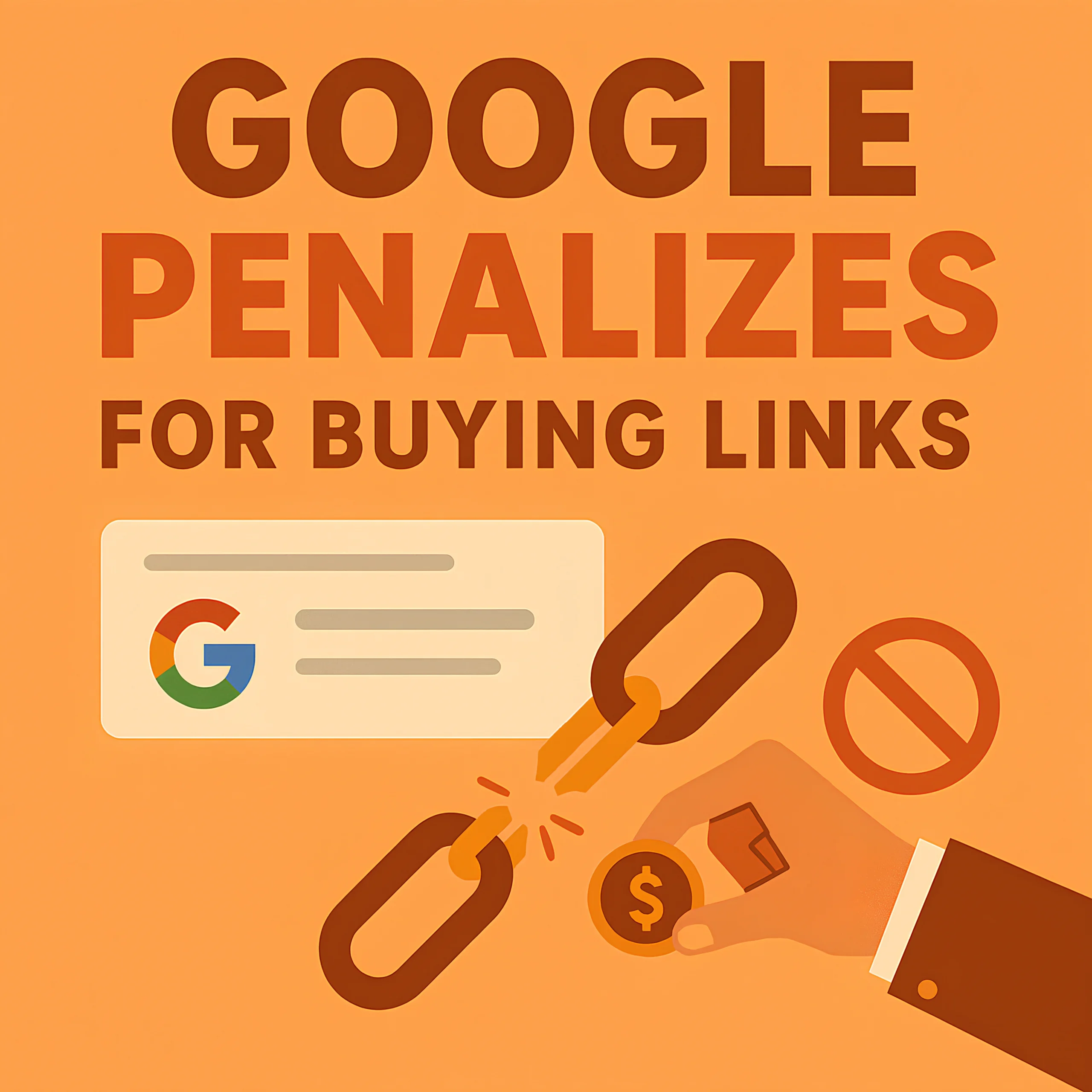
Imagine this: you’re cruising along, thinking those paid links are working like magic. Your rankings even shoot up for a minute. Then BAM! Out of nowhere, your site is buried deeper than old mixtapes in a closet. Google catches on to unnatural links faster than you’d think, and their penalties aren’t a slap on the wrist, they’re more like exile.
Now, let’s pause here. Because I know what you’re thinking: “But what if the links are high-quality? What if I’m careful?”
Sure, some providers promise “safe” backlinks. But let me ask you this: are you willing to risk your reputation on something you hope is safe? That’s like walking across a frozen lake without knowing how thick the ice is.
So, yeah, no assurance that purchased links will yield positive results, making it a risky investment. However, if you buy backlinks from good and relevant websites, use relevant and natural anchor text, and follow all best practices, the chances of Google detecting unnatural link patterns are nearly zero.
As an SEO expert and agency owner, I’ve seen it time and time again: business owners or clients get tempted by cheap, unsolicited offers to buy backlinks, often from unknown contacts who promise quick results at low prices. Whether it’s an offer for “high-quality” links at suspiciously low rates or a proposal to trade links, these options can seem appealing at first glance.
But buying backlinks without careful consideration is risky business. Cheap links or exchanges rarely provide long-term value and can harm your website’s organic backlinks. To avoid costly mistakes and protect your site’s reputation, it’s essential to stay far from certain types of links that I’ll detail below.
If the linking site isn’t relevant to your niche or content, the backlink won’t carry much SEO weight. Search engines prioritize contextual relevance, so irrelevant links can signal an unnatural linking pattern.
These networks are designed purely to sell links and often contain low-quality, spammy content. Google actively penalizes sites associated with PBNs, which can result in significant ranking drops or even de-indexation.
Automated services often generate spammy or low-quality backlinks, violating search engine guidelines. These unnatural links can be easily detected by algorithms, leading to penalties and a loss of SEO efforts.
Site-wide links appear on every page of the linking website, which can look unnatural to search engines. They often dilute link equity and make your backlink profile appear manipulative rather than organic.
If a linking website has been penalized or removed from search engine indexes, its backlinks will not pass any SEO value.
Excessive reciprocal links (e.g., “you link to me, and I’ll link to you”) are considered manipulative and violate Google’s link schemes guidelines.
Backlinks from websites in a different language or targeting an unrelated audience can confuse search engines about your website’s relevance.
Buying the wrong backlinks might give you a quick boost, but the long-term risks far outweigh the benefits. It’s like building a house on sand; it might look stable for a while, but eventually, it’ll collapse.
So, the next time someone offers you a deal on backlinks that sounds too good to be true, remember this: in SEO, you reap what you sow. Put in the effort to earn your links the right way, and your website will thank you in the long run.
Despite various rumors, in my opinion, link buying will continue to be a part of search engine optimization for many years. So, if you want to be successful and avoid investment loss or penalties, here are a few killer tips for beginners to keep your backlink profile natural and build long-term success for your company.
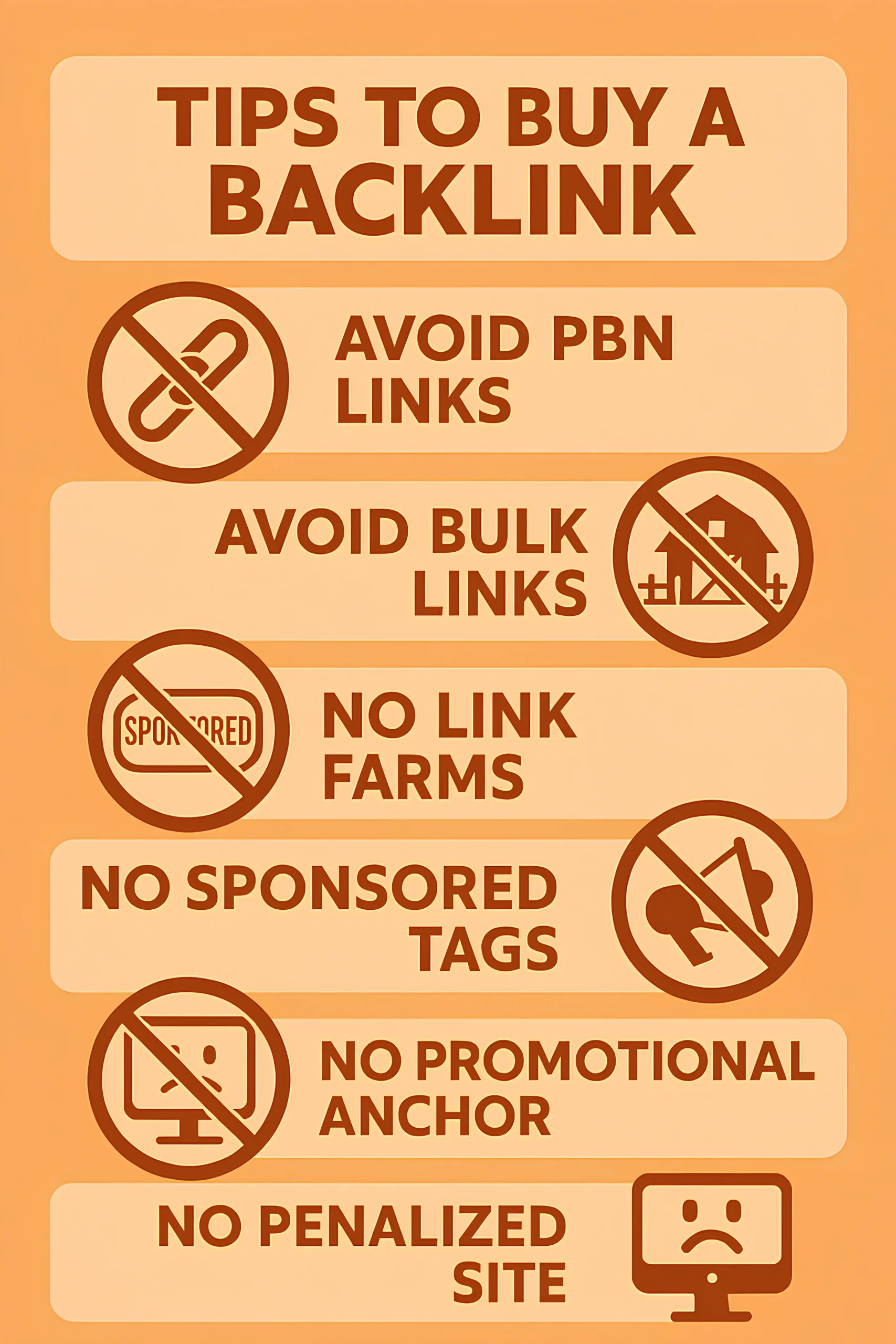
I’ve noticed that many guest post articles only contain the target (promoted) URL which is a big mistake because content that only promotes a specific link may be flagged as suspicious.
As it revolves entirely around a single URL.
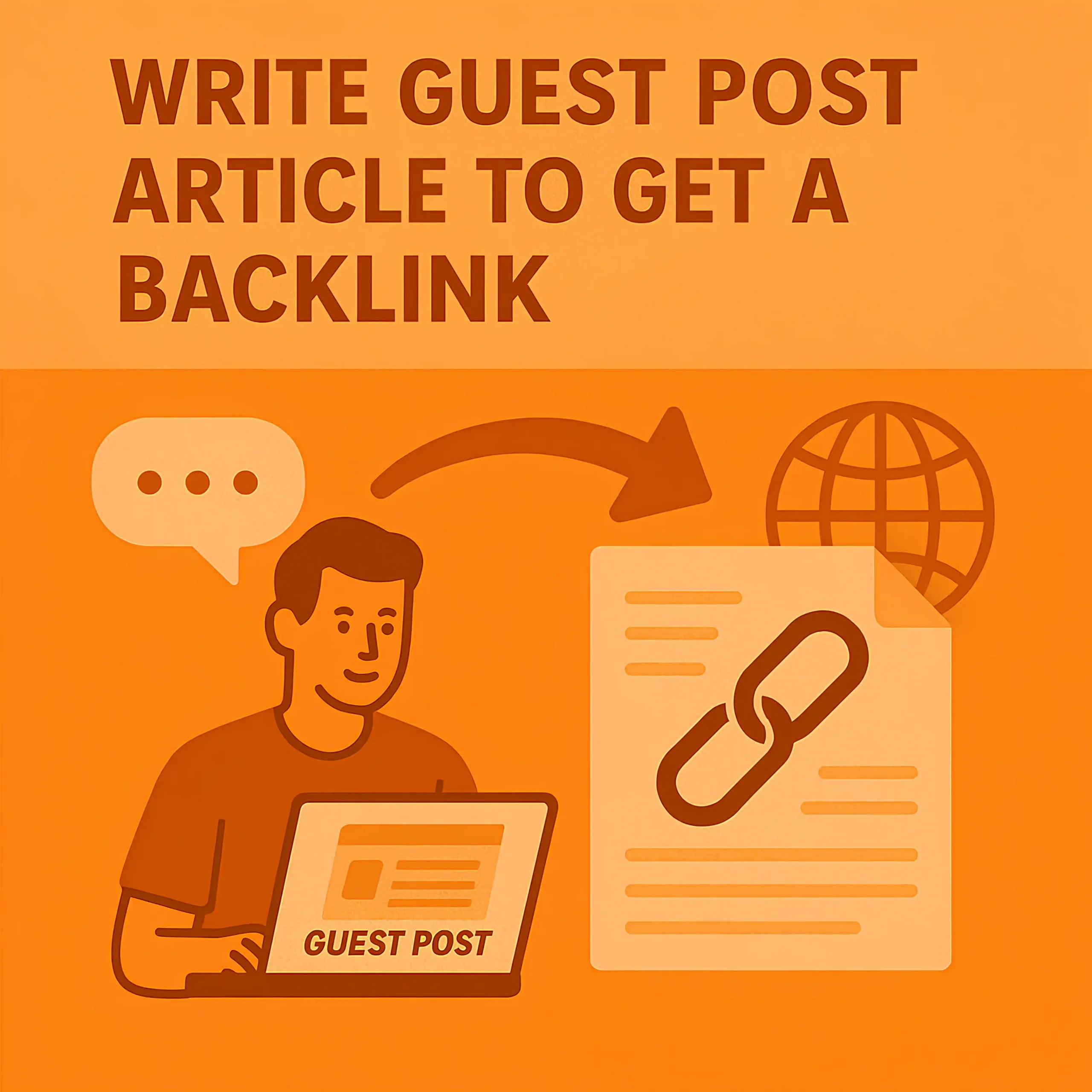
One lonely promotional backlink, dropped into the content like it’s the star of the show. And while it might feel like you’re being strategic, this is where things can go very wrong.
Let me explain: Providing a guest post that includes only a single URL, specifically a promotional backlink, without incorporating other external or internal links is a significant mistake for several reasons.
When you include just one link, a promotional one at that, it screams self-interest. Readers, editors, and search engines alike can smell it from a mile away.
Such guest posts can trigger a sense of distrust. “Is this post genuinely helpful,” people might wonder, “or is it just here to push an agenda?”
And let’s not forget Google. The algorithm is sharp, and single, obvious backlinks can send red flags. It’s like waving a neon sign that says, “This post exists solely to rank for this link.” Search engines aren’t a fan of one-sided efforts like this.
So, what should you do instead?
Include other links that guide the reader deeper into the topic. Reference relevant internal pages on the host website; it shows you’ve done your homework and care about their audience. Incorporate other authoritative external links that back up your points or give readers further insights.
When your guest post becomes a well-rounded, valuable piece of content, your backlink no longer feels like an intrusion. It feels earned. It feels natural. People are more likely to engage with it, editors are more likely to accept it, and search engines are more likely to reward it.
So next time you’re crafting a guest post, don’t just drop a link and hope for the best. Think bigger. Make the entire post so good, so informative, and so authentic that your backlink feels like the cherry on top, not the whole sundae. That’s how you win.
Alright, let’s have a real talk; just between us content creators. You know, when it comes to buying links, it’s so tempting to go for those “too-good-to-be-true” deals, right? Like, bulk link packages that promise hundreds of backlinks for the price of a fancy coffee.
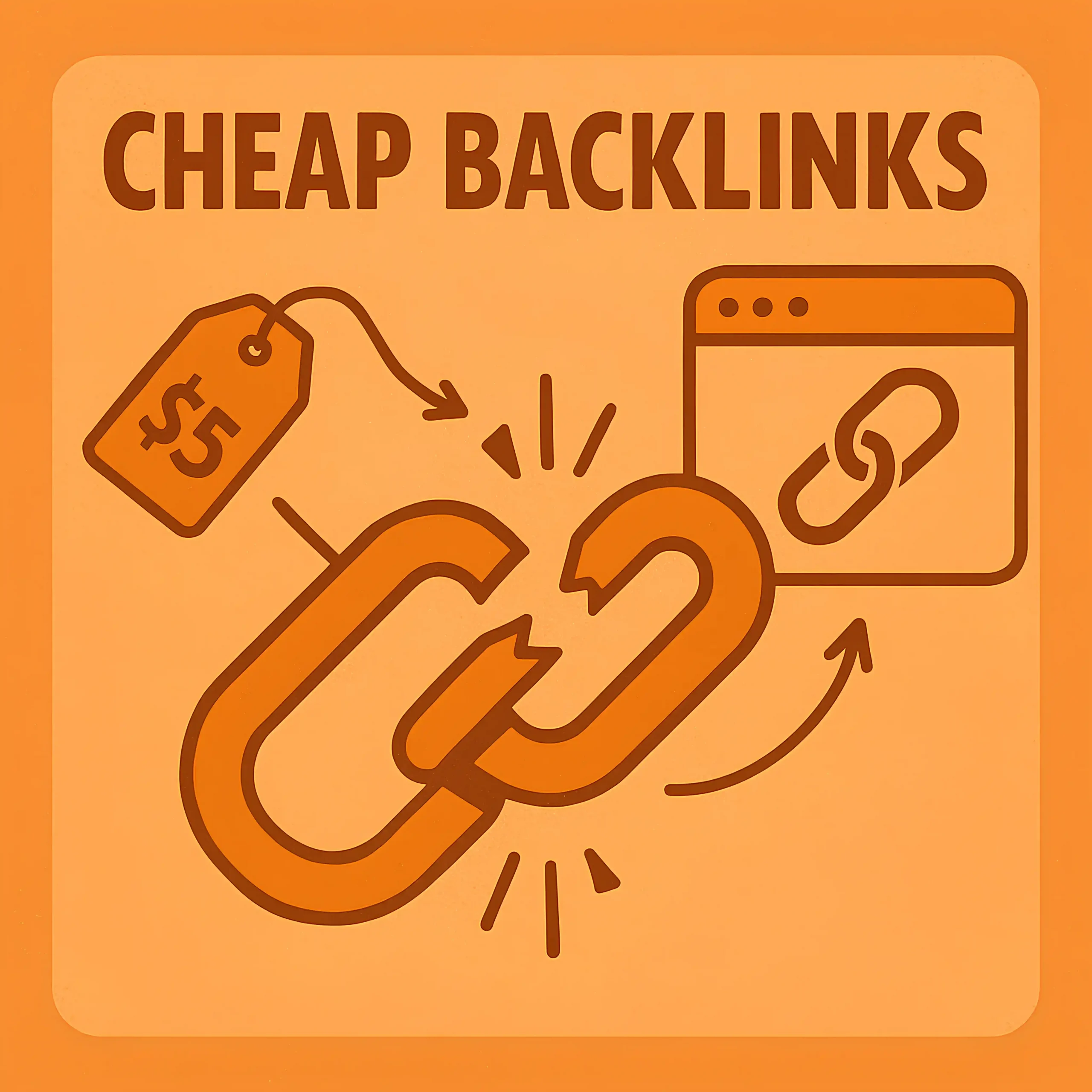
Cheap or bulk link sellers? They’re the fast food of the SEO world. Sure, it feels good at the moment, but in the long run? You’ll regret it.
Cheap links have always been attractive, especially for SEO clients. However, it’s important to avoid cheap links or bulk link sellers (or resellers) because these links are essentially ineffective, as they are easily accessible to a large number of buyers.
The thing about these cheap link sellers is that they don’t care about quality. They’re just throwing links out there like confetti: link farms, irrelevant directories, maybe even hacked sites.
Once Google flags your site or worse, penalizes you, you’ll end up spending way more trying to fix the damage. Disavowing toxic links, and rebuilding your credibility; it’s a nightmare.
The link equity that could have boosted your site’s SEO is spread thin across all the sites they’ve linked to, leaving “nothing left” for you in terms of tangible SEO benefits. Links from unrelated industries or topics don’t provide meaningful SEO value and can confuse search engines about your site’s focus. Moreover, these links typically come from non-authoritative or irrelevant sources, which offer little to no value.
So next time you’re attracted by a bulk link package, take a deep breath and remember: cheap links come at a high cost. You and your site deserve better.
Alright, let’s talk about something that feels like a rookie mistake but is surprisingly common: promotional anchor texts. You know the ones. Those overly salesy, try-hard phrases like “Best SEO Services” or “Cheapest Link Building Deals.” Yeah, those.
Google sees right through that. And let me tell you, it’s not impressive.
Imagine walking into a room full of professionals and someone hands you a business card that screams, “World’s Greatest Human Ever – Call Me NOW!” Cringe, right? That’s exactly what promotional anchor texts feel like to search engines and, honestly, to your audience. It’s a red flag that screams manipulation.
Now, let me be clear. I’m not saying you should avoid descriptive or branded anchor texts entirely. Quite the opposite. Use something natural. Something that flows seamlessly with the context of your content. Something that feels like it belongs there. “Learn more about SEO strategies” or “Discover effective link-building techniques”. These don’t just sound better; they build trust. They make people want to click.
Another key point I would like to emphasize is the use of exact-match anchor texts when promoting your products or services. Of course, you can target exact match anchors but don’t overuse them. Just as keyword stuffing in content is frowned upon, overusing promotional anchor texts is considered manipulative.
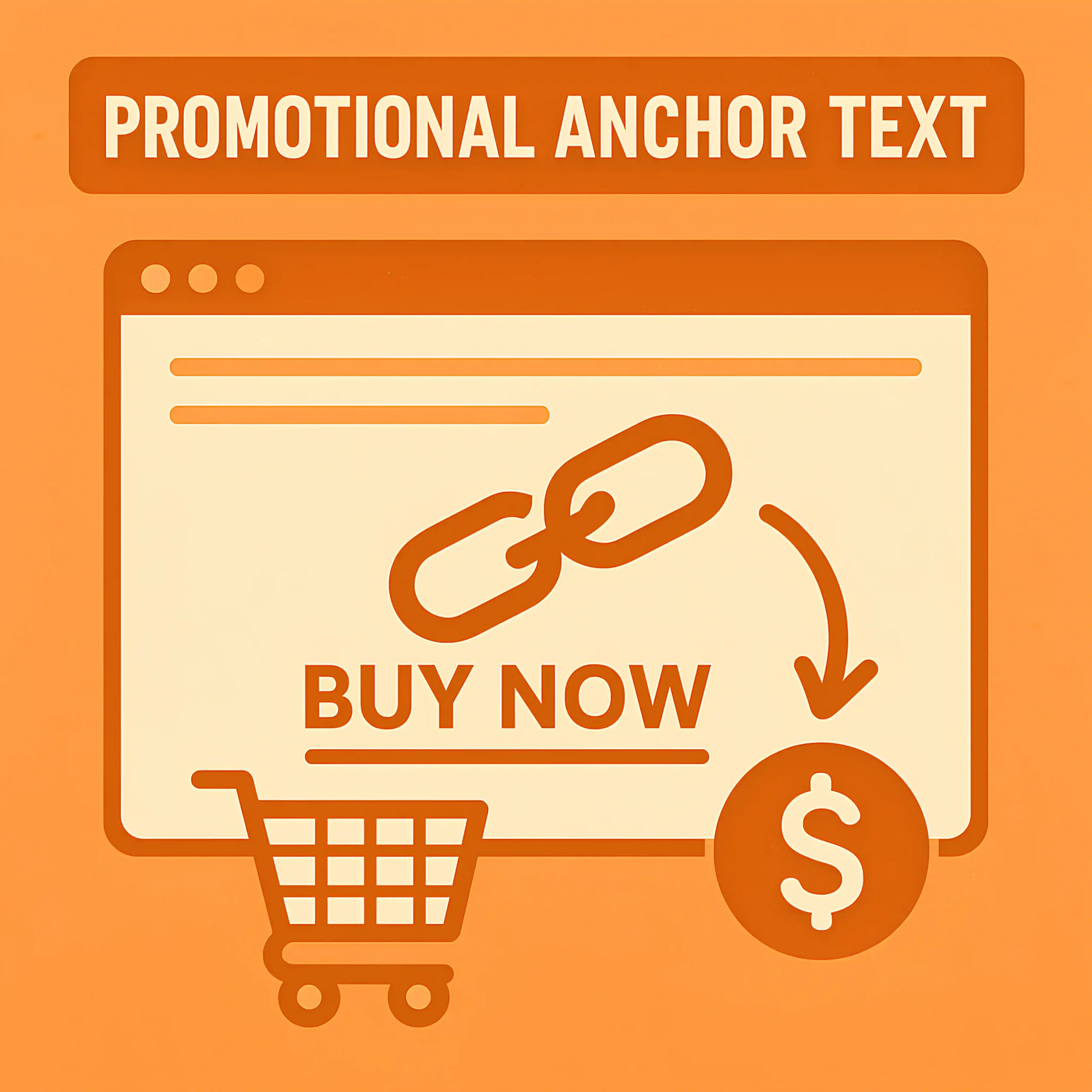
Instead, use a mix of anchor types such as branded anchors, phrases or exact-match keywords sparingly, and long-tail variations. Always aim for a natural distribution that reflects how users and other websites would organically link to your content.
So, let’s agree on this: ditch the salesy anchors. Write for people first, not search engines. The links will come, the clicks will follow, and trust me, your SEO will thank you for it.
PBNs (Private Blog Networks) or link farms have become a real headache for SEO companies that promise quality work at reasonable prices. If you’re not in a gray niche, there is no valid reason to buy links from PBNs. A Private Blog Network (PBN) is a collection of websites created specifically to build backlinks to a main website, with the intent of manipulating search engine rankings.
If search engines detect you buy links from PBNs, your site may receive a manual penalty affecting all pages, not just those linked via the PBN. In some cases, Google may even remove your site entirely from its index, making it invisible in search results.
Time and money spent on a PBN could be better invested in legitimate SEO tactics that provide lasting value. So, whether you’re planning to buy backlinks for your website or clients, my only advice is to never buy links from PBNs unless it’s your only option.
I’ve done SEO for many clients including law firms, real estate agents, and medical companies, and here’s what I’ve found: backlink relevance is key, so always try to secure links on websites that are relevant to your industry. A few backlinks from highly relevant sites are more valuable than numerous links from unrelated or low-quality sites.
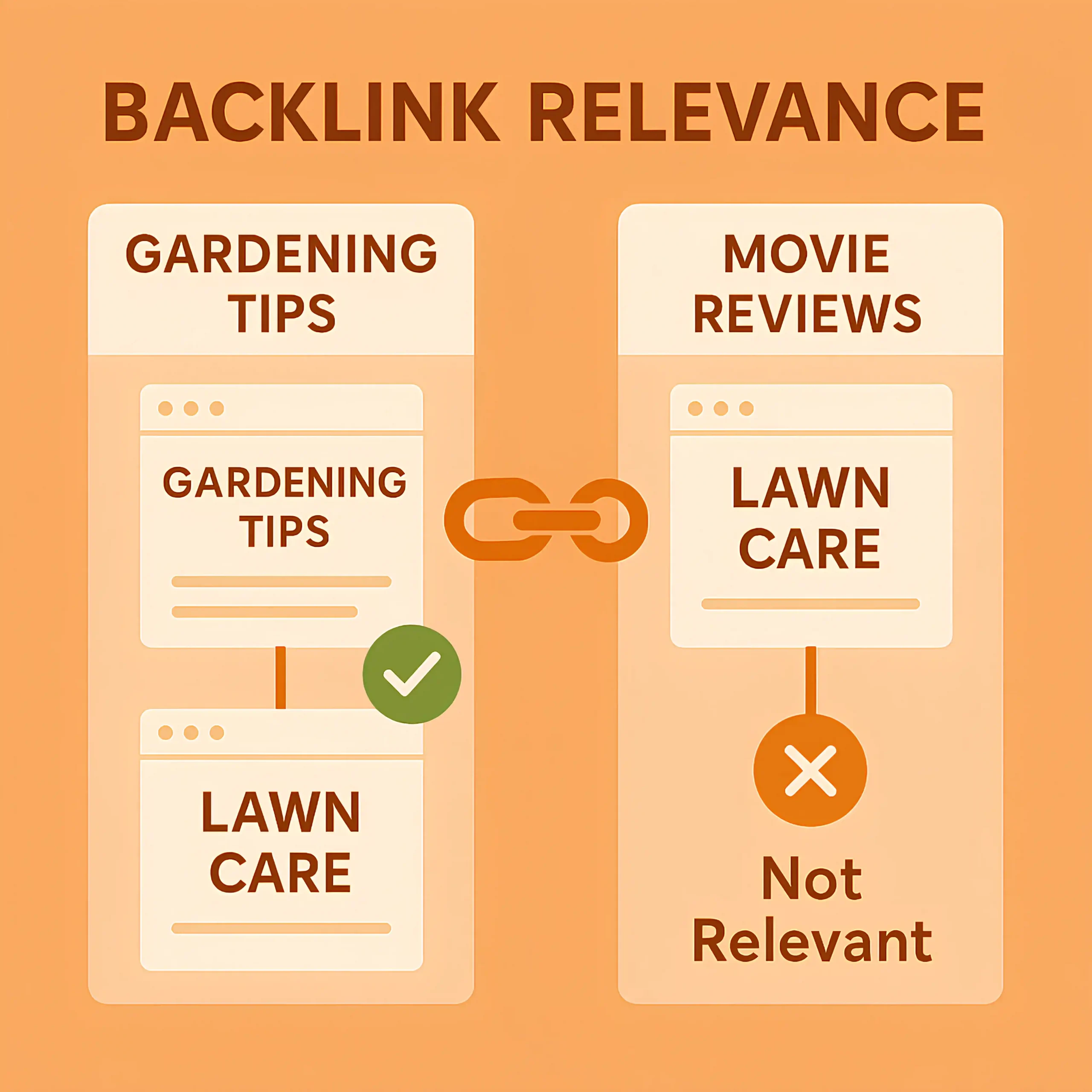
It’s also very important to consider semantic relevance and make sure that the content the link comes from is contextually related to your content because modern search engines use sophisticated NLP algorithms to comprehend the meaning behind words and phrases in content. So they don’t just look at keywords in isolation but analyze the context in which they appear.
But to be fair, it’s important to note that receiving backlinks from relevant websites doesn’t necessarily mean that if you’re building links for a SaaS website, all the referring domains must be SaaS blogs or companies. You can also acquire links from business, success, news, and similar websites, which will still be considered relevant opportunities.
Buying links from penalized websites is like trying to improve your credit score by associating with someone who just declared bankruptcy. Search engines consider the quality and reputation of the sites linking to you. I believe that penalized websites carry little to no SEO value or worse, they may actively harm your rankings.
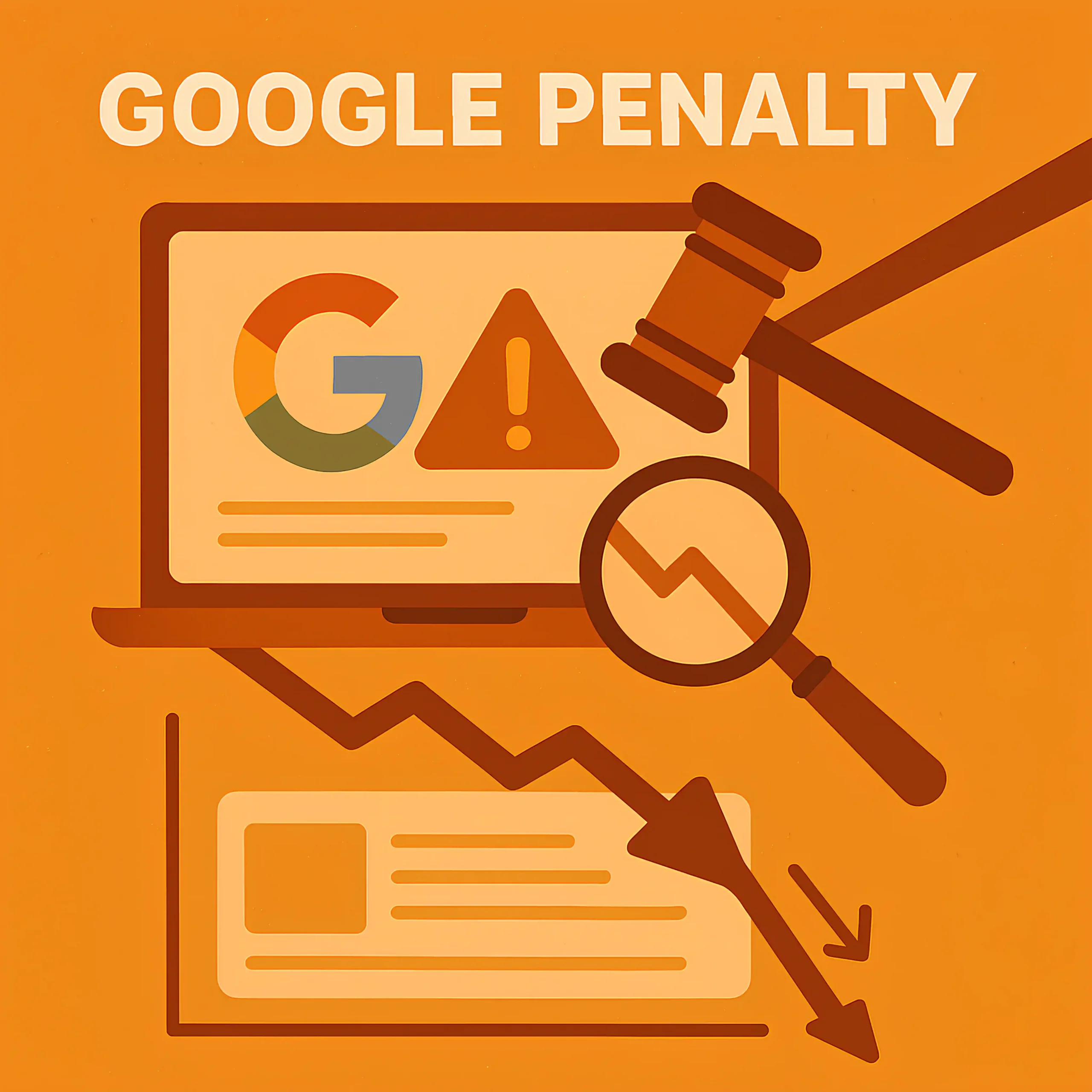
Another thing is that quality websites may avoid linking to you if they notice your backlink profile includes links from penalized sites. In short, buying backlinks from already penalized websites is a risky strategy that can lead to significant negative consequences for your own site’s SEO performance, reputation, and overall success.
Here are the quick steps to check if a website might be penalized using Ahrefs:
In Ahrefs’ Site Explorer, enter the website URL.
Look at the Organic Traffic graph in the Overview tab. A sharp drop may indicate a penalty.
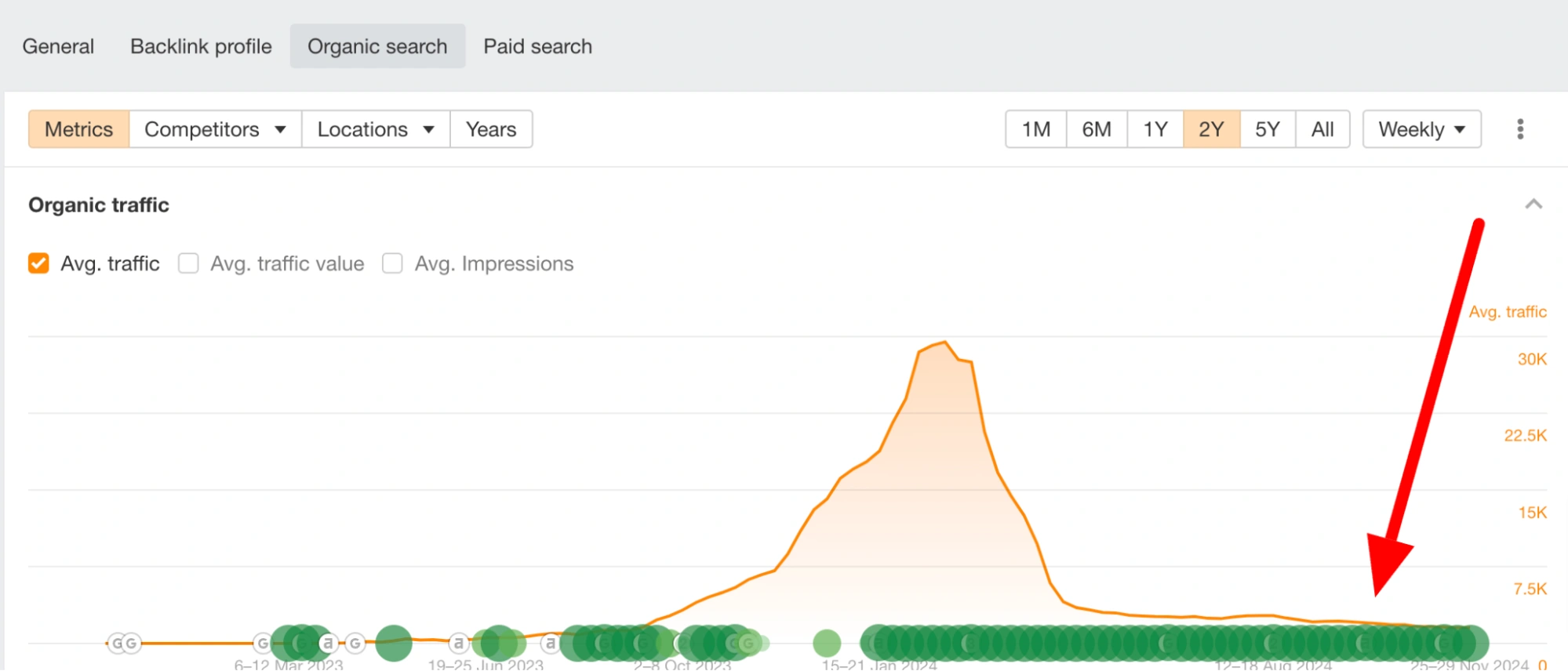
You can also perform similar checks using other tools like SEMrush or Ubersuggest for additional insights.
Let me tell you something important, something a lot of people overlook when buying backlinks: traffic can be deceiving. You might look at a website on Ahrefs or any other tool and think, Wow, this site has great organic traffic. This must be a solid place to get a backlink. But hold on, don’t get fooled by the numbers on the surface.
Like this one:
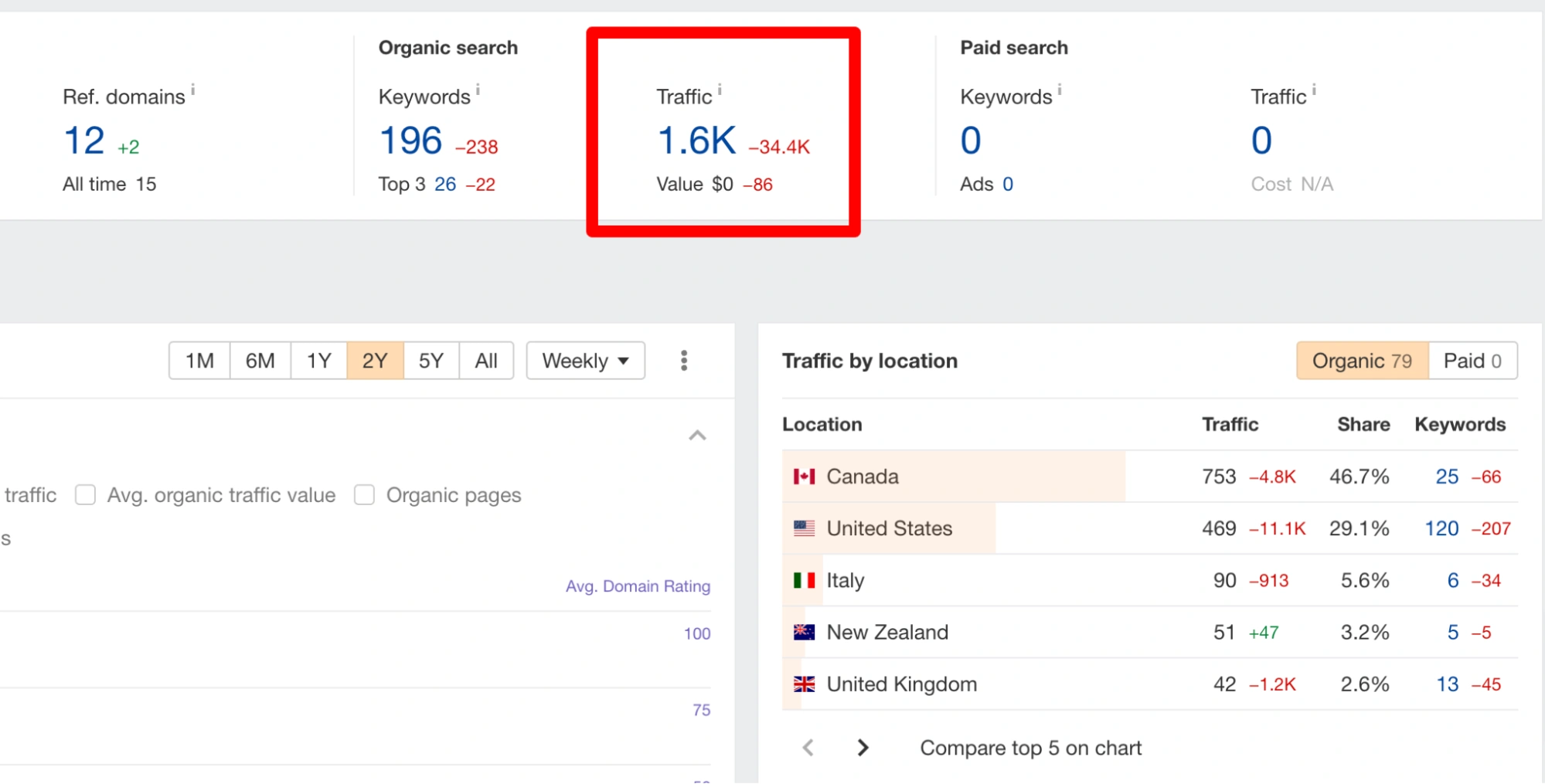
When you dig deeper and check their top-ranking pages, something feels… off. You notice they’re ranking for completely unrelated or, worse, random keywords that make no sense for their niche.
Like this one:
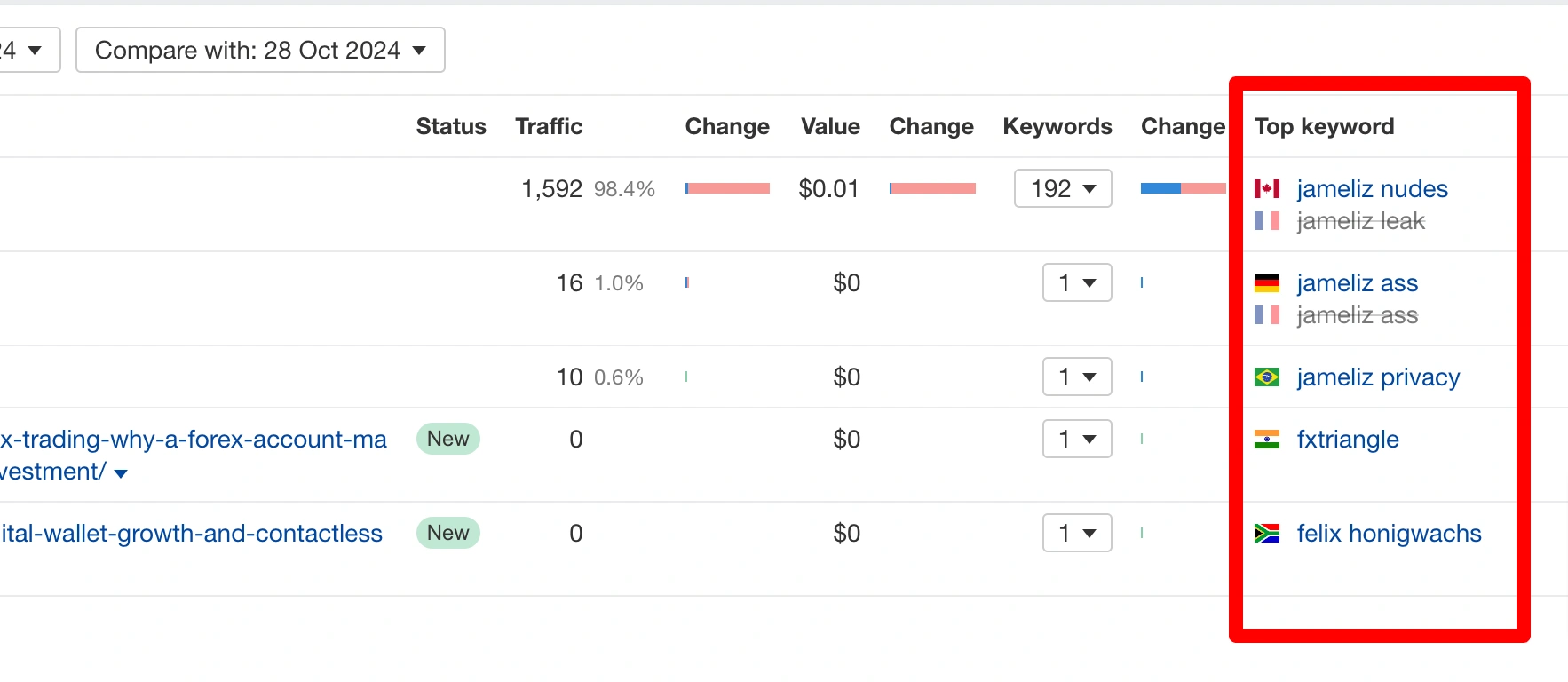
Why does this matter? Fake traffic won’t bring you any value. Sure, the numbers might look pretty, but if that traffic comes from irrelevant keywords, bots, or even manipulative practices like click farms, it’s useless to you.
Search engines are smarter than you think. Google knows when a website is attracting fake, low-quality traffic, and linking to your site from these kinds of websites can actually hurt your reputation. It’s like borrowing credibility from someone wearing a knockoff designer suit; it just doesn’t hold up under scrutiny.
When you buy links that come with a “sponsored” tag – it’s not that the tag itself is bad; Google requires it for transparency, and ethically, it’s the right thing to do.
But, they don’t pass what’s called “link juice.” That sweet, ranking-power goodness you’re paying for? Yeah, it doesn’t flow through a sponsored tag.
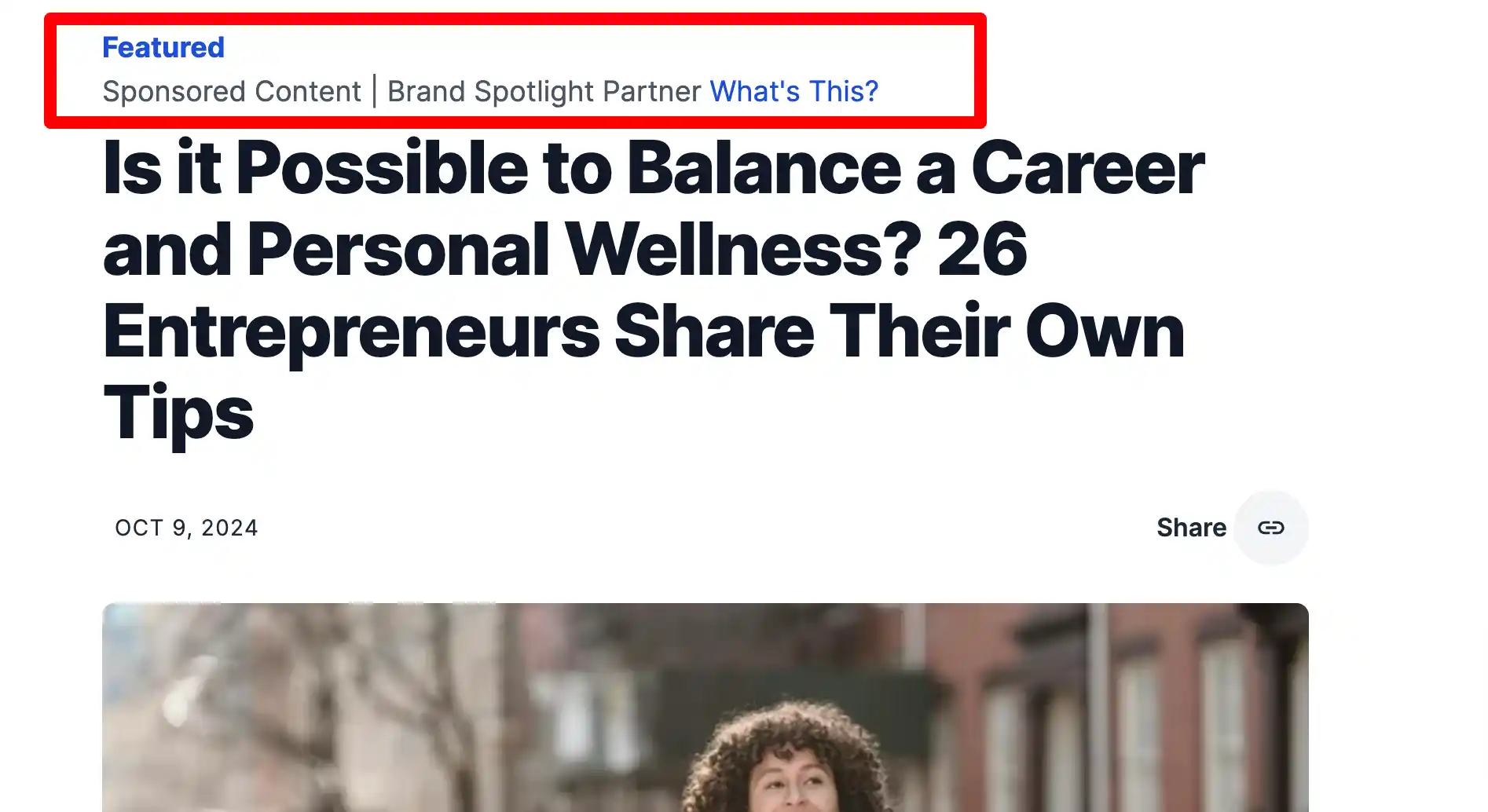
So, picture this: you’ve spent hours researching the right publishers, negotiating prices, and finally paying for a shiny new backlink on a high-authority website. You’re thinking, “Yes! My rankings are going to skyrocket, and this is going to be worth every penny.” But then, you take a closer look, and boom, there it is. A rel=”sponsored” tag slapped onto your precious link. And suddenly, the excitement fizzles.
Some publishers will insist that sponsored tags are mandatory, they’ll say it’s “to comply with Google’s guidelines” or that it’s “the industry standard.” Listen, I get it. They’re trying to cover their bases. However, if they’re insisting on using that tag, it’s a big red flag. It’s a sign they’re more focused on playing it safe than actually helping you grow your rankings. If the link doesn’t deliver on its purpose, what are you even paying for?
Your backlinks need to be dofollow. Full stop. No sponsored tags, no nofollow. Just a clean, straightforward dofollow link that tells search engines, “This page is worth checking out.” Anything less is a compromise, and compromises don’t win the SEO game.
So, here’s the takeaway: only work with publishers who understand the value of a dofollow link and are willing to deliver exactly that. Don’t let anyone tell you otherwise.
Short Answer: No, there is no guarantee that purchased backlinks will be effective. Even within the broader context of search engine optimization, there are no absolute guarantees. What works today might not work tomorrow, and changes in algorithms can affect organic rankings without warning. Additionally, SEO success depends on factors like competition within your industry, user behavior, and emerging trends; all of which are dynamic and unpredictable.
The number of backlinks you should purchase isn’t a one-size-fits-all answer. It depends on several key factors. For example, If your current backlink profile lacks diversity, adding a large number of similar backlinks can look unnatural and may raise red flags with search engines. So, first of all, I would highly recommend assessing your existing backlinks to identify gaps.
If your website is new, a sudden influx of backlinks can seem suspicious. In this case, start by acquiring backlinks slowly to mimic natural growth. Finally, the competitiveness of your industry significantly influences how many backlinks you might need. Sectors like finance, health, and technology often require more backlinks due to intense competition. Always adjust your backlink quantity and quality based on industry norms and competition levels.
As I already said, nofollow links carry an attribute that tells search engines not to pass SEO “juice” from the linking page, which limits their direct impact on rankings. Buying these types of links can end up being a low-ROI choice, as they don’t carry the authority boost you typically want from purchased links.
However, if you earn nofollow links because of high-quality content, that’s a different story. Earned nofollow links are great because they contribute to a natural-looking backlink profile, building credibility and trust. They can also drive traffic, build brand visibility, and even lead to more valuable dofollow links as others in your industry notice your content. So, while I wouldn’t suggest paying for nofollow links, seeing them come in organically is a sign that your content is hitting the mark and creating honest interest.
I know that it’s a common misconception to focus on Domain Authority ( MOZ DA) or Domain Rating (Ahrefs DR) as key performance indicators (KPIs) after buying links. Of course, DA or DR might seem like progress but it’s not the metric that truly reflects your site’s success. In reality, your primary KPIs should be organic rankings and traffic growth. These are the true indicators of your SEO strategy’s effectiveness. DA and DR are third-party metrics that can be manipulated or boosted even through low-quality or spammy links, which may inflate these scores but don’t contribute to meaningful, lasting growth.